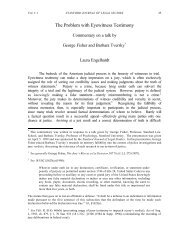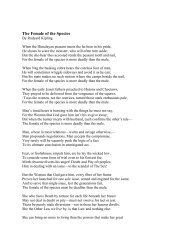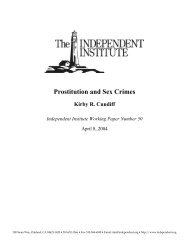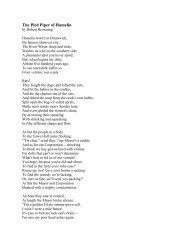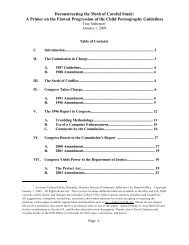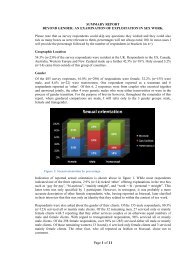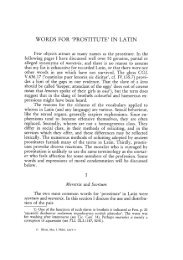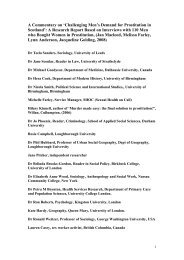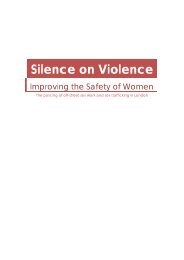sentencing memo
sentencing memo
sentencing memo
Create successful ePaper yourself
Turn your PDF publications into a flip-book with our unique Google optimized e-Paper software.
Case 2:10-cr-20400-AJT-PJK Document 91 Filed 05/06/11 Page 1 of 32<br />
UNITED STATES OF AMERICA,<br />
vs.<br />
Plaintiff,<br />
GREGORY CARR,<br />
Defendant.<br />
Jennifer L. Blackwell<br />
Assistant United States Attorney<br />
211 W. Fort St, Ste 2001<br />
Detroit, MI 48226<br />
(313) 226-9165<br />
Paul DeCailly, P59341<br />
DeCailly Law Group, PA<br />
1207 N. Franklin St., Ste. 327<br />
Tampa, FL 33602<br />
(813) 286-2909<br />
attorney@pdlaw.net<br />
Attorney for Defendant<br />
UNITED STATES DISTRICT COURT<br />
FOR THE EASTERN DISTRICT OF MICHIGAN<br />
SOUTHERN DIVISION<br />
)<br />
)<br />
)<br />
)<br />
)<br />
)<br />
)<br />
)<br />
)<br />
)<br />
Memo - 1 of 32<br />
Case No.: 10-cr-20400 AJT-PJK<br />
Hon. Arthur J. Tarnow<br />
DEFENDANT GREGORY CARR’S SENTENCING MEMORADUM<br />
Gregory Carr respectfully requests this Court to impose a sentence that is “sufficient, but<br />
not greater than necessary” to achieve the <strong>sentencing</strong> purposes of 18 U.S.C. § 3553(a).<br />
A. Introduction<br />
FACTS<br />
Gregory Carr is a 44 year old male, divorced, and a father of one child, 5 years old. He<br />
stands before the Court for <strong>sentencing</strong> on his first and only criminal offense. Prior to this case,<br />
Mr. Carr has had no contact with the criminal justice system, state or federal. Currently he
esides with his parents, and his girlfriend. He sees his son whenever possible, usually every<br />
weekend. He holds gainful full-time employment as a courier. He has been on pre-trial release<br />
since July 23, 2010, and has complied with all conditions imposed by the Southern District of<br />
Florida, and this Court.<br />
B. Personal Background<br />
Greg was born on September 22, 1966 to Leonard and Rita Carr. Greg has a younger<br />
brother, Steven Carr, and no sisters. He was born in Dearborn, Michigan, and attended<br />
elementary, middle school and high school in Dearborn Heights. During high school, Greg was<br />
recognized and awarded a certificate of recognition by the State of Michigan for outstanding<br />
academic achievement in the State of Michigan Scholarship Competition. (Exhibit A). After High<br />
School, Greg attended and graduated Central Michigan University with a Bachelor of Arts<br />
Degree, majoring in journalism. (Exhibit B). After graduating from college, Greg moved to<br />
Naples, Florida to take a job with the Naples Daily News. Greg worked and lived in Naples until<br />
1991 and then moved to Fort Lauderdale, Florida to take a position with the Sun Sentinel<br />
newspaper. Greg worked as an account representative for the Sentinel until 1994. While Greg<br />
was living in Florida, the Internet emerged, affording businesses the opportunity to advertise<br />
“online.” Greg recognized this opportunity and began taking courses in computer-based graphic<br />
design, which led him to a position in the Graphic Design Department of Viacom Corporation‟s<br />
Fort Lauderdale office.<br />
In 1996, Greg launched his own local newspaper called the Coral Springs Community<br />
News. The paper catered to the local community, and, like all newspapers, derived its income<br />
from selling advertising space. The paper struggled for two years, and in 1998, the business<br />
closed.<br />
Case 2:10-cr-20400-AJT-PJK Document 91 Filed 05/06/11 Page 2 of 32<br />
Memo - 2 of 32
Case 2:10-cr-20400-AJT-PJK Document 91 Filed 05/06/11 Page 3 of 32<br />
C. The Escort Service<br />
One of the many advertisers of the Coral Springs Community News was a woman who<br />
owned and operated an escort service. In 1998, when the Coral Springs Community News failed<br />
leaving Greg destitute, he and a partner decided to launch their own escort service called “South<br />
Beach Escorts” which later became known as “Miami Companions” (herein “MC”). At first,<br />
the business was a State of Florida, licensed escort agency with escorts serving the South Florida<br />
area. In October of 1999, MC posted its first website, and suddenly, the company grew<br />
exponentially. With the boom of the Internet and advances in technology, MC was no longer<br />
restricted by geographic boundaries. MC grew with the boom and it was during this time that<br />
Greg met and began a working relationship with co-defendant Laurie Carr. The business<br />
relationship of Greg and Laurie Carr developed into a romantic relationship, and eventually the<br />
couple married.<br />
From the day they met, Laurie was involved in the managerial decisions of MC. The idea<br />
of coordinating “tours” for the escorts was first suggested by Laurie, and she floated the idea to<br />
several of the escorts who were featured on the Internet. The escorts were very receptive to the<br />
idea. Specifically, the escorts liked the idea of planning their own “tour” dates because it<br />
afforded them the opportunity to plan a day-to-day schedule in advance. As MC was then a<br />
successful, quick-growing company with a good reputation, the number of escorts who wanted to<br />
be represented by MC and appear on the website also grew quickly. At no time did Greg ever<br />
“recruit” an escort; every escort contacted MC for interviews, which Greg conducted. These<br />
interviews were usually conducted in coffee houses and restaurants, and were never held in<br />
private. MC represented several adult film stars, including Brianna Beach, who is referred to in<br />
the indictment as Female “C”. Brianna Beach first applied to be an independent contractor with<br />
Memo - 3 of 32
Case 2:10-cr-20400-AJT-PJK Document 91 Filed 05/06/11 Page 4 of 32<br />
Miami Companions on December 3, 2006. (Exhibit C). This kind of notoriety turned MC into the<br />
nation‟s “most prestigious dating service.”<br />
As time passed, the number of escorts grew and the list of clients also grew, increasing<br />
the demands from escorts and clientele. This growth necessitated the need for additional office<br />
staff. The decision was made to outsource the appointment setting by phone to a call center<br />
located in Panama, based upon the low cost of wages in Central America. There, co-defendant,<br />
Nayubet L. Swaso first applied to be a phone operator, was hired, and was later promoted to<br />
manage the MC‟s call center. Eventually the call center relocated to Costa Rica, and Swaso<br />
asked to be relocated there to continue with her employment. Greg and Laurie agreed to this<br />
request; Swaso was the lone employee who transferred to Costa Rica. Otherwise, an entirely<br />
new office staff was brought on board.<br />
In 2008, like all businesses in the United States, MC began to feel the pinch of the<br />
economy, and business was dropping fast. The call center was closed, and the task of answering<br />
phones was moved back to the United States. Greg and Laurie Carr wanted out of the business,<br />
and began exploring other business opportunities. Meanwhile, co-Defendant Michelle<br />
Matarazzo, (also known as “Liv Lawless” when she was an adult film actress) who had been<br />
making travel arrangements for the escorts for several years, wanted MC to continue business<br />
operations. Michelle and her husband set up a bank account under the company name DJM<br />
Entertainment, where they deposited MC‟s revenues. (Exhibit D). While Greg had other ideas for<br />
starting new businesses, MC was the only means of income for Matarazzo. Thus, on May 26,<br />
2009, MC officially changed ownership from Greg and Laurie to Michelle Matarazzo and her<br />
husband Dominick.<br />
Memo - 4 of 32
Case 2:10-cr-20400-AJT-PJK Document 91 Filed 05/06/11 Page 5 of 32<br />
When DJM began to fully operate and control MC, the company‟s revenues rapidly<br />
declined, so much so that Matarazzo decided to go back out on “tour” herself, and on or about<br />
July 14, 2009, she was arrested. Matarazzo was interviewed by the IRS and FBI on August 26,<br />
2009. (Exhibit E). During the interview, she indicated to the FBI that Greg and Laurie still<br />
owned and operated the business, which was clearly a false statement. Matarazzo indicated that<br />
Laurie was the “boss” of MC. At her interview, Matarazzo, who was also the company‟s<br />
bookkeeper, admitted that prior to her takeover of MC, she had “skimmed” cash deposits without<br />
the knowledge of Greg or Laurie.<br />
Despite being arrested and speaking to the FBI and IRS, Matarazzo continued to own and<br />
operate MC as well as her new start-up, the “Adult Resource Center”, intended to be a shell<br />
company, to which Matarazzo intended to transfer all MC‟s business activities and clientele.<br />
(Exhibit F). Matarazzo continued running the businesses under the watchful eye of the Federal<br />
Government. Finally, after Matarazzo‟s “skimming” had elevated to the point where she retained<br />
virtually all company revenue and refused to pay any company expenses, her activities were<br />
recognized by Greg and Laurie Carr creating animosity between the Matarazzos and the Carrs.<br />
The business was on the verge of closing. Greg, now separated from Laurie, reluctantly agreed<br />
to take the company back in February of 2010. However, most of the escorts that once worked<br />
for MC had moved on to other agencies or began escorting independently. Upon information and<br />
belief, most of the escorts no longer wanted to contract with MC because Matarazzo was taking<br />
money from them that was earmarked for advertising and diverting it to her own use.<br />
The Carrs eventually were forced to file for relief under the Bankruptcy Code in<br />
September 2009 since neither were able to afford the mounting debt they faced. In early 2010,<br />
the Matarazzos essentially abandoned MC after having pilfered and embezzled as much money<br />
Memo - 5 of 32
Case 2:10-cr-20400-AJT-PJK Document 91 Filed 05/06/11 Page 6 of 32<br />
from the escorts as possible and, when MC had been virtually mismanaged into bankruptcy, they<br />
gave it back to Greg. Greg attempted to resurrect MC from the ashes, but was virtually starting<br />
over from scratch. Escort services are built largely on reputation and the Matarazzos had<br />
destroyed the reputation of MC. It was a slow go for many months, and just as MC was starting<br />
to show signs of life, Greg was arrested on the charges for which he now faces <strong>sentencing</strong>.<br />
Since his arrest, Greg has complied with all conditions of his probation. He is no longer<br />
involved in the adult industry in any way.<br />
A. Impact of the Guidelines<br />
ARGUMENT<br />
It has been six years since the Supreme Court released the district courts from the<br />
mandatory Sentencing Guidelines in United States v. Booker, 543 U.S. 220 (2005). In the wake<br />
of Booker, it is essential that district courts make an “individualized assessment based on the<br />
facts presented.” Gall v. United States, 552 U.S. 38, 50 (2007). The Supreme Court further<br />
emphasized that the District Court “is in a superior position to find facts and judge their import<br />
under §3553(a) in the individual case…This means that “[t]he <strong>sentencing</strong> judge has access to,<br />
and greater familiarity with the individual case and the individual defendant before him than the<br />
[Sentencing] Commission or the appeals court.” Id., quoting Rita v. United States, 551 U.S. 338,<br />
357-58 (2007). After United States v. Booker invalidated the mandatory use of the Sentencing<br />
Guidelines and declared them "effectively advisory," the district court has been tasked with<br />
imposing "„a sentence sufficient, but not greater than necessary to comply with the purposes‟ of<br />
§ 3553(a)(2)." United States v. Foreman, 436 F.3d 638, 644 n. 1 (6th Cir. 2006).<br />
One of the earliest re<strong>sentencing</strong> cases after Booker was the District Court for the<br />
Southern District of Texas‟ re<strong>sentencing</strong> of James Olis in a conspiracy to commit mail fraud case<br />
Memo - 6 of 32
arising out of the Dynergy collapse, in which he had been sentenced under mandatory guidelines<br />
to a 292-month term of imprisonment. United States v. Olis, 2006 WL 2716048 (S.D.Tex. 2006).<br />
Upon re<strong>sentencing</strong>, United States District Judge Sim Lake imposed a 72-month sentence and<br />
with respect to the Guidelines, explained that “since Booker the guidelines are „merely one<br />
<strong>sentencing</strong> factor among many, and the calculated guideline range must be considered in<br />
conjunction with the other § 3553(a) factors.‟” The court further emphasized that “the guidelines<br />
do not have „quasi -mandatory status.‟” Id, at *11 (citation omitted).<br />
The Government will mechanistically argue for a “sentence within the Guidelines.”<br />
despite the unambiguously clear mandate from the Supreme Court that the Sentencing<br />
Guidelines are only advisory, are but one factor to be considered under § 3553(a), and need not<br />
be presumed reasonable. Respectfully, this Court should reject the Government‟s invitation.<br />
that:<br />
Case 2:10-cr-20400-AJT-PJK Document 91 Filed 05/06/11 Page 7 of 32<br />
The Sixth Circuit has opined on the issue of “presumptive reasonableness” and noted<br />
We pause to make two observations. First, in United States v. Foreman, we<br />
recently suggested in dicta that Williams' statement regarding the Guidelines'<br />
rebuttable presumption of reasonableness was "rather unimportant" even though it<br />
seems to "imply some sort of elevated stature to the Guidelines ...." United States<br />
v. Foreman, 436 F.3d 638, 644 (6th Cir.2006). Foreman observed that "Williams<br />
does not mean that a Guidelines sentence will be found reasonable in the absence<br />
of evidence in the record that the district court considered all of the relevant<br />
section 3553(a) factors." Id. Lest there be some confusion on this point, we note<br />
that as Foreman properly explained, "Williams does not mean that a sentence<br />
within the Guidelines is reasonable if there is no evidence that the district court<br />
followed its statutory mandate to `impose a sentence sufficient, but not greater<br />
than necessary' to comply with the purposes of <strong>sentencing</strong> in section 3553(a)(2)."<br />
Id.<br />
* * *<br />
Second, although ancillary to our decision in this case, we are mindful of the<br />
ongoing discussion among the circuit courts since our decision in Williams as to<br />
whether Booker accords the Guidelines a presumption of reasonableness. See,<br />
e.g., United States v. Jimenez-Beltre, 440 F.3d 514, 518 (1st Cir.2006) (en banc)<br />
("[a]lthough making the guidelines `presumptive' or `per se reasonable' does not<br />
make them mandatory, it tends in that direction ...."); United States v. Fernandez,<br />
Memo - 7 of 32
443 F.3d 19, 27 (2d Cir.2006) ("declin[ing] to establish any presumption,<br />
rebuttable or otherwise, that a Guidelines sentence is reasonable"); United States<br />
v. Kristl, 437 F.3d 1050, 1054 (10th Cir.2006) (observing that sentences correctly<br />
calculated under the Guidelines are "entitled to a rebuttable presumption of<br />
reasonableness on appeal"); United States v. Lewis, 436 F.3d 939, 946 (8th<br />
Cir.2006) ("[A] sentence falling within the applicable guideline range is<br />
presumptively reasonable."). In particular, we note the recent deliberations of the<br />
Ninth Circuit and the Fourth Circuit in United States v. Zavala, 443 F.3d 1165<br />
(9th Cir.2006), and United States v. Johnson, 445 F.3d 339 (4th Cir.2006),<br />
respectively.<br />
U.S. v. Cage, 458 F.3d 537 at 541-542 (6th Cir., 2006). The Sixth Circuit, later reaffirmed the<br />
“reasonableness” standard of review for appellate purposes and not the standard by which the<br />
District Court determined a sentence under § 3553 in U.S. v. Vonner, 516 F.3d 382 (6th Cir.,<br />
2008). 1<br />
Case 2:10-cr-20400-AJT-PJK Document 91 Filed 05/06/11 Page 8 of 32<br />
The Honorable Jed Rakoff in the Southern District of New York revealed the “travesty of<br />
justice that sometimes results from the guidelines‟ fetish with abstract arithmetic, as well as the<br />
harm that guideline calculations can visit on human beings if not cabined by common sense.”<br />
United States v. Adelson, 441 F.Supp.2d 506, 511 (S.D.N.Y. 2006). In the Court‟s Sentencing<br />
Memorandum, Judge Rakoff attested to the absurdity of a government attorney blindly adhering<br />
1 In United States v. Williams, 436 F.3d 706, 708 (6th Cir.2006), this court embraced an appellate presumption<br />
of reasonableness for within-guidelines sentences. In Rita, the Court upheld the presumption. 127 S.Ct. at 2462.<br />
Rita, we recognize, does not hold that appellate courts must embrace the presumption. See id. at 2462, 2467; see<br />
also Gall v. United States, ___ U.S. ___, 128 S.Ct. 586, 597, 169 L.E d.2d 445 (2007). But we see no good reason<br />
to abandon the presumption now—after using it for some time and after being told that we may continue to use<br />
it. The presumption, as the Supreme Court has explained, rests on sound reasoning. The guidelines represent<br />
the Sentencing Commission's attempt to reconcile the same § 3553(a) factors that district courts must consider<br />
in <strong>sentencing</strong> defendants. See Rita, 127 S.Ct. at 2463-64. These factors seek to balance Congress's competing<br />
interests in consistency, see § 3553(a)(4)-(6) (requiring <strong>sentencing</strong> courts to consider the guidelines, pertinent<br />
policy statements and "the need to avoid unwarranted <strong>sentencing</strong> disparities"), and in individualized<br />
<strong>sentencing</strong>, see § 3553(a)(1)-(3), (7) (requiring <strong>sentencing</strong> courts to consider "the nature and circumstances" of<br />
the crime and the defendant, the purposes of punishment and the types of punishment available). And, perhaps<br />
most importantly, when there is a confluence between the national views of the Sentencing Commission and the<br />
independent views of a <strong>sentencing</strong> judge, that "double determination significantly increases the likelihood that<br />
the sentence is a reasonable one." Rita, 127 S.Ct. at 2463. Add to this the reality that the presumption is<br />
rebuttable, id., and that there is no "presumption of unreasonableness" for outside-guidelines sentences, id. at<br />
2467, and we fail to see a material downside to continuing to use the presumption as a modest tool for appellate<br />
review.<br />
Memo - 8 of 32
to the “prevailing policy” of the Department of Justice seeking “a guideline sentence” when it<br />
was obvious that other important factors under § 3553(a) would not support the lengthy term of<br />
imprisonment under the Guidelines.<br />
In fact, almost one year ago, the Attorney General of the United States issued a<br />
comprehensive, revised “Department Policy on Charging and Sentencing,” which rejected the<br />
prior blind adherence to a “Guidelines Sentence” and imposed a new policy reflecting that “equal<br />
justice depends on individualized justice, and smart law enforcement demands it.” See, May 19,<br />
2010 Memorandum to All Federal Prosecutors. While the Memorandum directs prosecutors to<br />
“generally continue to advocate for a sentence within [the guidelines] range,” advocacy at<br />
<strong>sentencing</strong> – like charging decisions and plea agreements – must also follow from an<br />
individualized assessment of the facts and circumstances of each particular case.” Id at pp. 2-3.<br />
The compelling individual facts of this case establish that the general rule of <strong>sentencing</strong> within<br />
the Guidelines range is inappropriate, will not serve the ends of individualized justice, and is not<br />
equitable law enforcement. A copy of the Attorney General‟s May 19, 2010 Memorandum is<br />
attached hereto as Exhibit “F”. More importantly, advocating a “Guidelines Sentence” is in<br />
direct contrast to the trend of the district courts in every circuit of this Nation, which are<br />
imposing sentences below the Guidelines range when merited. The most recent quarterly data<br />
published by the U. S. Sentencing Commission reflects a steady decrease of sentences “within<br />
range” and a progressive increase of sentences “below range,” even when they are not<br />
Government sponsored pursuant to Guideline 5K1.1.10 Any contention by the Government that<br />
seeks to impose a Guidelines Sentence in this case without justifying such a sentence under all of<br />
the factors of § 3553(a) should be rejected by this Court as being violative of Booker, Gall and<br />
Rita.<br />
Case 2:10-cr-20400-AJT-PJK Document 91 Filed 05/06/11 Page 9 of 32<br />
Memo - 9 of 32
Case 2:10-cr-20400-AJT-PJK Document 91 Filed 05/06/11 Page 10 of 32<br />
To be sure, in imposing the final sentence in this case, the Supreme Court commands that<br />
this Court must calculate the Advisory Guidelines, before deciding whether to apply any<br />
departures or variance from the Guidelines. However, the Supreme Court does not require this<br />
Court to commence its <strong>sentencing</strong> analysis with a review of the Advisory Guidelines. In fact,<br />
Congress mandated that of all the factors set forth under § 3553(a), “the kinds of sentence and<br />
the <strong>sentencing</strong> range established” by the Guidelines is only the fourth consideration. As District<br />
Judge Rakoff explained in Adelson, § 3553(a) “gives first position to „(1) the nature and<br />
circumstances of the offense and the history and characteristics of the defendant.” 441 F.Supp.2d<br />
at 512-13. Gregory Carr has no criminal history. Circuit Judge Barkett of the U.S. Court of<br />
Appeals for the Eleventh Circuit recently explained the importance of not deferring to the<br />
Guidelines in imposing a sentence. See United States v. Docampo, Jr., 573 F.3d 1091, 1105<br />
(11th Cir. 2009)(concurring in part and dissenting in part). Judge Barkett addressed the conflict<br />
in the Supreme Court‟s post-Booker decisions that the district court start the imposition of the<br />
sentence with a calculation of the Guidelines, while permitting the district courts to “tailor the<br />
sentence in light of other statutory concerns” and reaffirming that the district courts may not<br />
presume that the Guidelines range is reasonable. Judge Barkett explained:<br />
There is, of course, a wide range between a “starting point warranting respectful<br />
consideration” and “no presumption of reasonableness.” Some of the Supreme<br />
Court Justices have expressed serious concern about how to apply the Guidelines<br />
given the latent ambiguity in their advisory nature: “[I]f <strong>sentencing</strong> judges<br />
attributed substantial gravitational pull to the now-discretionary Guidelines, if<br />
they treated the Guidelines result as persuasive or presumptively appropriate, the<br />
Booker remedy would in practical terms preserve the very feature of the<br />
Guidelines that threatened to trivialize the jury right.” Rita, 551 U.S. at 390, 127<br />
S.Ct. 2456 (Souter, J., dissenting); see also id. At 366, 127 S.Ct. 2456 (Stevens, J.,<br />
concurring)(“I am not blind to the fact that, as a practical matter, many federal<br />
judges continued to treat the Guidelines as virtually mandatory after our decision<br />
in Booker.”)<br />
Memo - 10 of 32
Case 2:10-cr-20400-AJT-PJK Document 91 Filed 05/06/11 Page 11 of 32<br />
Circuit Judge Barkett further explained how the Guidelines inevitably have a considerable<br />
“anchoring” effect on a district court‟s analysis:<br />
Anchoring is a strategy to simplify complex tasks, in which numeric judgments<br />
are assimilated to a previously considered standard. When asked to make a<br />
judgment, decision-makers take an initial starting value (i.e., the anchor) and then<br />
adjust it up or down. Studies underscore the significance of that initial anchor;<br />
judgments tend to be strongly biased in its direction. Id., at note 5. Finally, Judge<br />
Barkett explained that <strong>sentencing</strong> judges must “make a concerted effort to reach<br />
independent conclusions about the appropriateness of a sentence in each specific<br />
case.” Id. (emphasis in original).<br />
In this matter, Probation has calculated the guidelines at 41 – 51 months based upon the<br />
information provided by the Justice Department. However, the parties have agreed to guidelines<br />
of 21 – 27 months in the Rule 11 plea agreement.<br />
The difference between the scoring by Probation and the agreed upon range in the rule 11<br />
agreement is: (i) the rule 11 agreement, as mutually agreed by the parties, does not score all of<br />
the women contained in the indictment, and (ii) the parties scored Greg‟s role at three (3) points,<br />
rather than the four (4) points. The defense would argue that the calculations agreed to in the<br />
rule 11 plea agreement are more in line with the best possible outcome after a trial for the<br />
Government, and reflect the reality of the case.<br />
(i) The scoring disparity regarding the various women<br />
While probation scored witness A-H and Co-Defendant Swaso, the parties agreed to<br />
score only Witness B and Co-Defendant Swaso. Witness A, upon her arrest had indicated to<br />
police that MC did not require the escorts to have sex with client. (Exhibit G). Witness C is an<br />
adult film star who has made over 75 movies during her career. Witness D currently tours as an<br />
independent escort, and during the pendency of this case, the Defense was able to locate her in<br />
Columbus from October 18 th – the 23 rd , Cleveland from October 24 th – the 29 th , and in<br />
Philadelphia on January 10 th , 2011. Witness E is currently working independently touring<br />
Memo - 11 of 32
Case 2:10-cr-20400-AJT-PJK Document 91 Filed 05/06/11 Page 12 of 32<br />
throughout Canada. Defense has no information on Witness F but suspects that she no longer<br />
resides in the Country. Witness G is currently working independently out of Boston, and the<br />
Defense was able to track her movements throughout New England during the pendency of this<br />
matter. Witness H had filed for Bankruptcy a month before being arrested in Michigan, and<br />
actually attended her meeting of creditors just a few days before her arrest. She had disclosed,<br />
on her Schedule I that her occupation was “entertainer,” and listed thousands of dollars a month<br />
in travel expenses in her Schedule J. She testified at her meeting of creditors that certain fees<br />
paid as house fees or management fees.<br />
The point of this witness breakdown is to illustrate that the Defense believes that these<br />
multiple witness issues were the cornerstones of the successful plea negotiations. By having an<br />
open and mutually respectful dialog between the defense and the Government, each side giving<br />
the other a look at what the evidence actually shows and what the issues would beat trial lead to<br />
the agreement that was achieved and how and why the agreed upon guidelines are at the 21 – 27<br />
month range is appropriate, and that the Court should give greater weight to the agreed upon<br />
guidelines which contain recommend variances when considering its starting point for<br />
<strong>sentencing</strong>.<br />
(ii) Role in the offense<br />
Probation scored Greg the full four (4) points as the alleged leader of the criminal<br />
enterprise, however, the Defense disagrees with that scoring and proffers that the three (3) point<br />
enhancement is more appropriate.<br />
A district court may increase a defendant's offense level if the defendant was an<br />
"organizer, leader, manager, or supervisor of one or more other participants."<br />
U.S.S.G. § 3B1.1, cmt. n.2. "A 'participant' is a person who is criminally<br />
responsible for the commission of the offense, but need not have been convicted."<br />
U.S.S.G. § 3B1.1, cmt. n.1. In determining whether a § 3B1.1(c) <strong>sentencing</strong><br />
enhancement is appropriate, a district court should consider the following factors:<br />
Memo - 12 of 32
Case 2:10-cr-20400-AJT-PJK Document 91 Filed 05/06/11 Page 13 of 32<br />
[T]he exercise of decision making authority, the nature of participation in the<br />
commission of the offense, the recruitment of accomplices, the claimed right to a<br />
larger share of the fruits of the crime, the degree of participation in planning or<br />
organizing the offense, the nature and scope of the illegal activity, and the degree<br />
of control and authority exercised over others.<br />
United States v. Lalonde, 509 F.3d 750, 765 (6th Cir. 2007). "Merely playing an essential role in<br />
the offense is not equivalent to exercising managerial control over other participants. The<br />
government bears the burden of proving that the enhancement applies by a preponderance of the<br />
evidence." United States v. Vandeberg, 201 F.3d 805, 811 (6th Cir. 2000).<br />
In this matter, MC was operated “by committee”. MC never had a centralized office<br />
location or clearly defined leadership roles within the organization. Greg was primarily<br />
responsible for interviewing new applicants that had contacted the company, arranging the<br />
photography, touching up photos, and sometimes collecting money from women who preferred<br />
not deposit into the various accounts while on tour. Greg also authorized transfer of funds to the<br />
call centers for payroll after review and approval of both Laurie and Michelle. Laurie Carr<br />
reviewed each female profile before they were posted on the website, determined which photos<br />
were to be used, had the day to day contact with MC clients in arranging meetings, and handling<br />
complaints from Clients. Michelle Matarazzo kept track of the income into the company,<br />
prepared deposits, created and maintained reports, made and paid for travel arrangements such as<br />
airfare and hotel reservations. Nayubet Swaso was responsible for managing the call center in<br />
Panama, and eventually Costa Rica.<br />
Although Greg initially formed MC, and was one of the signers on the bank account<br />
along with co-defendant Laurie Carr, it does not mean that he exercised managerial control of the<br />
day to day operations. In fact, according to the Government‟s star witness, Michelle Matarazzo,<br />
Laurie was “the boss” of MC. (see Exhibit E). To assess four (4) points against Greg, and not<br />
Memo - 13 of 32
Case 2:10-cr-20400-AJT-PJK Document 91 Filed 05/06/11 Page 14 of 32<br />
assess any leader or organizer points against any of the other co-defendants 2 is counter to the<br />
holding in Vandenburg. The parties have agreed to a variance in the plea agreement, only<br />
assessing three (3) points for Greg‟s role in the offense and the Defense urges the Court to do the<br />
same when determining its evaluation of the advisory guidelines.<br />
In closing out this portion, the Defense urges the Court to analyze the appropriate<br />
sentence for Greg by considering and utilizing the agreed upon guidelines attached to the Rule<br />
11 plea agreement filed with the Court. Those guidelines reflect a more realistic basis for<br />
calculation of <strong>sentencing</strong> based upon the evidence that would have been produced at trial, and<br />
are more consistent with Greg‟s participation in MC.<br />
B. §3553 Factors<br />
18 USC § 3553 states in relevant part<br />
Section 3553 Imposition of a sentence<br />
(a) Factors To Be Considered in Imposing a Sentence. - The court shall impose a<br />
sentence sufficient, but not greater than necessary, to comply with the<br />
purposes set forth in paragraph (2) of this subsection. The court, in<br />
determining the particular sentence to be imposed, shall consider –<br />
(1) the nature and circumstances of the offense and the history and characteristics<br />
of the defendant;<br />
(2) the need for the sentence imposed -<br />
(A) to reflect the seriousness of the offense, to promote respect for the<br />
law, and to provide just punishment for the offense;<br />
(B) to afford adequate deterrence to criminal conduct;<br />
(C) to protect the public from further crimes of the defendant; and (D) to<br />
provide the defendant with needed educational or vocational training,<br />
medical care, or other correctional treatment in the most effective manner;<br />
(2) the kinds of sentences available;<br />
(3) the kinds of sentence and the <strong>sentencing</strong> range established for –<br />
2 With the exception of Fabiola Contreras.<br />
Memo - 14 of 32
Case 2:10-cr-20400-AJT-PJK Document 91 Filed 05/06/11 Page 15 of 32<br />
(A) the applicable category of offense committed by the applicable<br />
category of defendant as set forth in the guidelines<br />
(i) The Offense - 18 USC §3553(1)<br />
As stated earlier in this <strong>memo</strong>randum, Judge Rakoff explained in Adelson, § 3553(a)<br />
“gives first position to „(1) the nature and circumstances of the offense and the history and<br />
characteristics of the defendant.‟” 441 F.Supp.2d at 512-13. Furthermore, during the plea, the<br />
Court indicated that it did not know what it would sentence Greg to because as the court knew<br />
very little about Greg, and very little about the offenses he pled guilty to. As noted herein, Greg<br />
has no criminal history and did not have a clearly defined “mastermind” role within MC.<br />
Greg plead guilty to two (2) counts, Count I – Conspiracy to commit violations of 18<br />
USC §2422(a) Coercion and enticement to travel in interstate commerce to engage in<br />
prostitution, and Count XI Conspiracy to Launder Monetary Instruments.<br />
18 USC 2422(a) states in relevant part:<br />
Sec. 2422. Coercion and enticement<br />
(a) Whoever knowingly persuades, induces, entices, or coerces any individual to<br />
travel in interstate or foreign commerce, or in any Territory or Possession of the<br />
United States, to engage in prostitution, or in any sexual activity for which any<br />
person can be charged with a criminal offense, or attempts to do so, shall be fined<br />
under this title or imprisoned not more than 20 years, or both.<br />
The statute is commonly referred to as “the Mann Act”. The Mann Act was originally entitled<br />
the “White-Slave Traffic Act of 1910.” It should be noted that, in the United States, women did<br />
not have the Constitutional right to vote until the Nineteenth Amendment to the Constitution was<br />
ratified in 1920. Prior to that, women were treated more like property: their property rights were<br />
subordinate to their husbands, and they did not enjoy equal rights under the law. When the<br />
“White-Slave Traffic Act of 1910” was passed, its original intent was to prohibit the<br />
Memo - 15 of 32
Case 2:10-cr-20400-AJT-PJK Document 91 Filed 05/06/11 Page 16 of 32<br />
transportation of “slaves” – in this case, women – for immoral purposes. 3 The Supreme Court<br />
elaborated on the concept of “immoral purposes” when it stated<br />
[There is] no doubt as to what class was aimed at by the clause forbidding the<br />
importation of alien women for purposes of 'prostitution.' [citing to what is now<br />
12 USC 1328] It refers to women who, for hire or without hire, offer their bodies<br />
to indiscriminate intercourse with men. The lives and example of such persons are<br />
in hostility to 'the idea of the family, as consisting in and springing from the union<br />
for life of one man and one woman in the holy estate of matrimony; the sure<br />
foundation of all that is stable and noble in our civilization; the best guaranty of<br />
that reverent morality which is the source of all beneficent progress in social and<br />
political improvement.'<br />
Murphy v. Ramsey, 114 U. S. 15, 45, 29 L. ed. 47, 57, 5 Sup. Ct. Rep. 747 (1885). It was later<br />
amended to cure the ambiguity of what “immoral purposes” meant. During the “immoral<br />
purposed debate, and whether congress had the authority to regulate what “immoral purposes”<br />
the Court‟s punted and simply relied upon the Commerce Clause to resolve the unconstitutional<br />
meddling into individuals‟ lives and bedrooms. The United States Supreme Court stated in one<br />
of the early cases:<br />
It may be conceded, for the purpose of the argument, that Congress has no power<br />
to punish one who travels in interstate commerce merely because he has the<br />
intention of committing an illegal or immoral act at the conclusion of the journey.<br />
But this act is not concerned with such instances. It seeks to reach and punish the<br />
movement in interstate commerce of women and girls with a view to the<br />
accomplishment of the unlawful purposes prohibited.<br />
The transportation of passengers in interstate commerce, it has long been settled,<br />
is within the regulatory power of Congress, under the commerce clause of the<br />
Constitution, and the authority of Congress to keep the channels of interstate<br />
commerce free from immoral and injurious uses has been frequently sustained,<br />
and is no longer open to question.<br />
3 Notably, in 1910, this transport was not by commercial airline. The first commercial flight in the<br />
United States was in 1914, between Tampa and Saint Petersburg, Florida. Interstate commercial<br />
flights came several years later, and were not widely available until after World War II. It was<br />
likely not by automobile either; the Ford Model T had just been produced in 1908. The drafters of<br />
the Mann Act, who were all likely born before 1880, were literally concerned with ―transporting‖<br />
women – ―white slaves‖ – by covered wagon.<br />
Memo - 16 of 32
Case 2:10-cr-20400-AJT-PJK Document 91 Filed 05/06/11 Page 17 of 32<br />
Moreover, this act has been sustained against objections affecting its<br />
constitutionality of the character now urged. Hoke v. United States, 227 U. S. 308,<br />
57 L. ed. 523 (1913).<br />
Drew Caminetti v. United States No 139 Maury Diggs v. United States No 163 Hays v. United<br />
States No 464, 242 U.S. 470, 37 S.Ct. 192, 61 L.Ed. 442 (1917). In other words, in that 1917<br />
decision, the Court was not concerned with people who traveled so they could have sex, for<br />
profit or otherwise. Instead, the Court said that its concern was about the “movement” of<br />
“women and girls” – both of whom were more like property than people – in interstate<br />
commerce. (The act could have just as well included animals in those parcels that could not be<br />
transported.)<br />
Throughout its history, the Mann Act has had various levels of penalties, most changes<br />
have dealt with violations of section B, which is focused upon individuals under the age of 18,<br />
which is not an issue in this case, but in its current form, holds a maximum penalty of 20 years in<br />
prison. 4 While not binding upon this Court, an examination of state law and specifically how<br />
the State of Michigan views what is substantially the same conduct is helpful determine the<br />
severity of the offense when considering §3553(1). Michigan‟s pandering statute 750.455 is<br />
Michigan‟s analog to the Mann Act. Specifically the act states “who shall inveigle, entice,<br />
persuade, encourage, or procure any female person to come into this state or to leave this state<br />
for the purpose of prostitution . . . or who shall receive or give or agree to receive or give any<br />
money or thing of value for procuring or attempting to procure any female person to become a<br />
prostitute or to come into this state or leave this state for the purpose of prostitution, shall be<br />
guilty of a felony, punishable by imprisonment in the state prison for not more than 20 years.”<br />
MCL 750.544.<br />
4 Greg Carr is charged with Conspiracy which holds a maximum of 5 years, but for the purposes of<br />
<strong>sentencing</strong>, the Defense focuses on the offense that Greg has plead guilty to conspiring to commit.<br />
Memo - 17 of 32
Case 2:10-cr-20400-AJT-PJK Document 91 Filed 05/06/11 Page 18 of 32<br />
Michigan, like in the Federal Criminal Code, utilizes guidelines for <strong>sentencing</strong> of felony<br />
offenders which were created by MCL 769.34 in 1999. Michigan‟s <strong>sentencing</strong> scheme first<br />
determines the category of crime by “victim” or type. Examples of “types” are crimes against a<br />
person, drug crimes, and crimes against public order. Pursuant to the most current <strong>sentencing</strong><br />
manual, pandering is a crime against public order. After determining the group into which the<br />
crime falls, Michigan classifies crimes from Second Degree Murder, being the most severe, to<br />
Classes A – H, with Class H being the least severe. Pandering is a Class G Felony. Upon the<br />
most stringent of scoring, Greg would score a prior record variable of 10 points because of the<br />
concurrent conviction of money laundering. Greg‟s offense variables would equal 20 points,<br />
which includes a full 10 points for the misguided allegation that he is the leader of the<br />
organization. According to the <strong>sentencing</strong> Grid for class G offenses, Greg would fall into an<br />
“intermediate cell” with a guideline range of 0 – 17 months. However, Michigan defines<br />
intermediate sanctions as:<br />
Intermediate sanction: Any sanction, other than imprisonment in a state<br />
prison or state reformatory, which may lawfully be imposed. MCL 777.1(d);<br />
MCL 769.31(b). Intermediate sanctions include, but are not limited to, one or<br />
more of the following:<br />
1) Inpatient or outpatient drug treatment or participation in a drug treatment court.<br />
2) Probation with any probation conditions required or authorized by law.<br />
3) Residential probation.<br />
4) Probation with jail.<br />
5) Probation with special alternative incarceration.<br />
6) Mental health treatment.<br />
7) Mental health or substance abuse counseling.<br />
8) Jail.<br />
9) Jail with work or school release.<br />
10) Jail with or without authorization for day parole.<br />
11) Participation in a community corrections program.<br />
12) Community service.<br />
13) Payment of a fine.<br />
14) House arrest.<br />
15) Electronic monitoring.<br />
Memo - 18 of 32
Case 2:10-cr-20400-AJT-PJK Document 91 Filed 05/06/11 Page 19 of 32<br />
2010 Michigan Judicial Institute, Michigan Sentencing Guidelines Manual, p. 10 (emphasis<br />
added). Under the Michigan Sentencing Scheme, for the identical conduct, Greg, absent a<br />
departure, would face a maximum incarceration of 12 months in the county jail. 5<br />
How does a Court measure the “seriousness of the offense” in terms of fashioning a just<br />
and proper sentence? By definition, all crimes are serious, and to look at the report of probation,<br />
it is hard to determine what level of seriousness probation has assigned. Certainly the Defense<br />
has a different view than the Government on the seriousness of the crime: This was a crime of<br />
“enticement.” Even the Government never alleged any fraud or any threat of force or violence.<br />
Simply stated, this is because there was none.<br />
Do we look at the Victims? Who are they? The answer to that can be found in paragraph<br />
44 of the Pre-Sentence Report. It is clear that Greg, Laurie, Michelle, and Nya never made any<br />
woman do anything against her will. In fact, the irrefutable evidence, including the business<br />
records of MC, the client list, calendar, and escort contact list, is littered with references and<br />
notes indicating that the escorts were in complete control of their travel, rate of pay, the types of<br />
clients they would see or not see, and their entire schedules. No personnel from MC ever<br />
traveled with the escorts or even kept an eye on the escorts while they were touring. In fact,<br />
many of them traveled with their husbands or boyfriends, who were not in any way affiliated<br />
with MC. (Contrast, the image of “transporting white slaves” in a covered wagon.) MC never<br />
required escorts to have sexual contact with any of their clients. (see Exhibit G). In fact, as the<br />
Court will read, many of the escorts (who are the Government‟s purported victims) have asked<br />
the Court to consider that Greg and MC provided them with nothing more or less than a safe<br />
5 It should be noted that the Michigan Sentencing Guidelines consider up to twenty (20) offensespecific<br />
variables when determining the severity level of the offense. In contrast, the Federal<br />
advisory guidelines has very few, if any, offense-specific variables.<br />
Memo - 19 of 32
Case 2:10-cr-20400-AJT-PJK Document 91 Filed 05/06/11 Page 20 of 32<br />
alternative to doing what they would do otherwise (and what many of them are doing following<br />
Greg‟s arrest): working as independent escorts, without the safety net of a client screening<br />
service. As a result of Greg‟s conduct, these women knew that when they met clients, the clients<br />
had been screened, verified, and that they were in a safe situation. If the government really<br />
sought to protect these women, it might not have shut down MC at all; while acknowledging that<br />
the women were engaging in illegal conduct, the government might have realized (as it<br />
acknowledges every day when it dispenses clean needles to heroin addicts) that they are at least<br />
engaging in that conduct in a manner which is safer for all involved.<br />
The Mann Act itself seeks only to punish the placing of the escorts into the “Stream of<br />
Commerce” with certain intent. Even after years of refinement, the act seeks to punish<br />
indiscriminately those who entice or coerce travel for the purpose of prostitution or any other<br />
sexual misdeeds that a particular State has deemed illegal. For example, MCL 750.30 makes<br />
adultery a felony in the state of Michigan, and MCL 750.29 defines that “[a]dultery is the sexual<br />
intercourse of 2 persons, either of whom is married to a third person.” So, in any federal district<br />
court in Michigan, under the Mann act, the government could charge a service like<br />
AshleyMadison.com, which encourages that “Life is short. Have an affair,” 6 and guarantees that<br />
“Under the AshleyMadison.com Affair Guarantee Program, if you don‟t find someone within the<br />
initial 3 months after purchasing the „Affair Guarantee‟ Membership Package,<br />
[AshleyMadison.com will] refund . . . the amount you paid for participating in the Program.” 7 If<br />
a member of AshleyMadison.com decides to “Have an affair” and visit Michigan to do so, under<br />
its terms, the Mann act applies. The Government can obtain a conviction under the Mann Act<br />
6 See http://www.ashleymadison.com/<br />
7 See http://www.ashleymadison.com/app/public/guarantee/detailsform.p<br />
Memo - 20 of 32
Case 2:10-cr-20400-AJT-PJK Document 91 Filed 05/06/11 Page 21 of 32<br />
without any conviction or even charging of the underlying state-based sexual offense, just that<br />
the conduct be intended before or during the travel in the stream of commerce. Should the<br />
founders of AshleyMadison.com or other websites that “entice” people to travel to meet each<br />
other be subject to imprisonment for it?<br />
The Mann Act is also one of the few criminal statutes that is dependent upon particular<br />
state law making it illegal “to engage in prostitution, or in any sexual activity for which any<br />
person can be charged with a criminal offense.” 18 U.S.C. § 2422. Currently, the exchange of<br />
money for sex is legal, under certain circumstances in the State of Nevada. Rhode Island<br />
recently outlawed prostitution in 2009. The Mann Act is dependent upon whether or not the<br />
intended activity upon completion of travel could be charged under State law for prostitution or<br />
other sexual activity that is deemed illegal in a particular state. This begs the question: how<br />
serious is an offense under United States law in one part of the United States where the identical<br />
conduct would not have been an offense under the same United States law in another part of the<br />
United States?<br />
It is interesting that in the Government‟s Sentencing Memorandum [DE 90] it cites to<br />
Prostitution and Trafficking in 9 Countries: An Update on Violence and Posttraumatic Stress<br />
Disorder, 2 Journal of Trauma Practice 34, 60 (2003) which talks of the way the women are<br />
often treated. They cite to the article, but fail to apply the finding of the authors to any specific<br />
facts or circumstances of the case of Miami Companions. Additionally, it is disingenuous of the<br />
Government to raise the issue of the plight of the prostitute in general, when the Department of<br />
Justice in Detroit has stated publicly that “Our goal is not to stamp out prostitution. I don't think<br />
we'll ever do that." she said. "But what we are concerned about is deterring criminal<br />
organizations from exploiting women as a commodity for profit." In sex cases, clients go free;<br />
Memo - 21 of 32
officials target bosses, Detroit Free Press, Feb. 14, 2011 (quoting Barbra McQuade, US<br />
Attorney for E.D. of Michigan). However in this case, by the time the Government decided to<br />
act, MC was bankrupt and doing very little business. The charges could have been brought<br />
immediately following the arrest of the first woman working in Detroit in 2007 when the<br />
business was thriving. Instead the Government waited until almost all the Defendants in this<br />
matter were broke, bankrupt, and almost homeless before it took action to shut down MC. The<br />
Government is obviously not seeking to protect anyone. Certainly such procrastination would<br />
not have occurred if the government considered there to be any person at risk or any true victim<br />
to exist.<br />
Case 2:10-cr-20400-AJT-PJK Document 91 Filed 05/06/11 Page 22 of 32<br />
The government, shamelessly, speaks about the exploitation of women, but had no<br />
problem with offering a 5K1 substantial assistance reduction to Rafael M. Bernabe-Caballero<br />
(herein “Marco”) in Case No. 08-CR-20658 for assistance and testimony in this case, and<br />
possibly others. Marco was charged with similar conduct arising out of his Escort Agency,<br />
known as Miami Ultimate. However, unlike Greg, Marco was very abusive to the women who<br />
worked for his agency. As explained by Witness A, in 2008 to federal investigators a tale of<br />
being forced to have sex with men without time for meals, threats of public humiliation,<br />
violence, and death threats. Marco was eventually indicted in the Eastern District of Michigan<br />
and the first superseding indictment charged him with four (4) Counts of “Sex Trafficking by<br />
Force or Coercion” 18 USC §1591, seven (7) counts of “Coercion and Enticement for the<br />
Purposes of Prostitution” 18 USC § 2422(a), one (1) Count of “Importation of Alien for Immoral<br />
Purposes” 8 USC §1328, Conspiracy and Finally, Forfeiture. The government graciously offered<br />
to dismiss 13 of 14 counts against Marco in exchange for his assistance in this and possibly other<br />
matters under investigation. It is astonishing that the Government would make a deal with<br />
Memo - 22 of 32
Case 2:10-cr-20400-AJT-PJK Document 91 Filed 05/06/11 Page 23 of 32<br />
Marco, with his violent nature, in exchange for his cooperation and possible testimony against<br />
Greg, Laurie, Michelle, and Fabiola. In the tens of thousands of pages of emails, investigative<br />
reports, and other documents, there is not one mention that Greg engaged in any form of violence<br />
or force upon the women who contracted with MC. These facts, in addition to the others<br />
outlined above clearly demonstrate the inconsistent policies behind the prosecution of what the<br />
US Attorney refers to as “deterring criminal organizations from exploiting women as a<br />
commodity for profit.” One would think that deterring the use of violence against women to<br />
force them into prostitution, by individuals like Marco, would hold a high priority over simply<br />
shutting down an agency known for its policies of not requiring anyone to do anything illegal,<br />
and left 99% of the decision making to the escorts.<br />
In summary, when evaluating the seriousness of the offense, the Court should focus not<br />
only on the crime classifications assigned to the criminal offense by the legislator, but the facts<br />
and circumstances of the offense as applied to the specific facts of this case. In this case the facts<br />
and circumstance favor a finding by the Court that this matter is considerably less serious than<br />
other similar cases throughout the Country.<br />
states in part:<br />
(ii) The Offense - 18 USC §1956<br />
Greg also plead to one (1) count of Money Laundering pursuant to 18 USC §1956 which<br />
Sec. 1956. Laundering of monetary instruments (a)(1) Whoever, knowing that the<br />
property involved in a financial transaction represents the proceeds of some form<br />
of unlawful activity, conducts or attempts to conduct such a financial transaction<br />
which in fact involves the proceeds of specified unlawful activity - (A)(i) with the<br />
intent to promote the carrying on of specified unlawful activity;<br />
The factual basis for the plea to this Count is straight forward. Greg directed funds to be<br />
transferred from Miami to Panama and Costa Rica for payment of wages of those who worked in<br />
Memo - 23 of 32
Case 2:10-cr-20400-AJT-PJK Document 91 Filed 05/06/11 Page 24 of 32<br />
the call centers. While the conduct is deemed illegal, there is no support for a finding that this<br />
behavior is equal to or more heinous than the other allegations for which Greg has taken<br />
responsibility.<br />
(iii) The history and characteristic of the Defendant<br />
This factor is more subjective and relies less upon statements of law, and more upon the<br />
Court‟s own observations of the Defendant, the information contained in the presentence report,<br />
information contained herein, and letters of support from those who know Greg.<br />
At the outset, it should be noted that Greg has been on pre-trial release for nine (9)<br />
months without incident. He obtained full time employment, and maintains a solid parental<br />
relationship with his young son. He has abstained from the use of illegal drugs, or any further<br />
contact with law enforcement. These actions demonstrate that he is capable of being a<br />
productive member of the community, and is able to follow terms and conditions imposed upon<br />
him by the Court which bodes well for a probationary sentence. Furthermore, this matter<br />
represents Greg‟s first contact with any state or federal criminal justice system in his 44 years.<br />
Attached to this <strong>memo</strong>randum are numerous letters of support from friends, family and<br />
even former Escorts who worked with MC in the past. The defense has spent a lot of time<br />
contemplating whether or not to include the letters of support from the Escorts, but in the end, if<br />
the Court is truly to have an understanding of Greg that such information should not be withheld<br />
from the court, especially in light of the <strong>sentencing</strong> <strong>memo</strong>randum filed by the Government.<br />
The letters from friends and family talk about Greg‟s caring, and sacrificing nature. They<br />
speak of him as a good father, and someone who can be counted on when times are tough, or<br />
someone is in need. The letters tell the Court that Greg is not known to be violent or aggressive<br />
Memo - 24 of 32
Case 2:10-cr-20400-AJT-PJK Document 91 Filed 05/06/11 Page 25 of 32<br />
towards women. Most speak to his loyalty as a friend, and his openness about his charges. They<br />
seek leniency from the Court and so does Greg.<br />
The letters from the former escorts talk about MC as a good place to work, and how<br />
respectfully they were treated by the staff and management of the company. Some common<br />
themes throughout these letters are Greg‟s respectful nature, and the safe environment that MC<br />
provided though its screening process. The Court might remember the fight over the client list,<br />
and the references to the depth of information that was maintained on the client list (the “List”).<br />
Greg has always viewed the List from the aspect of safety of the women. The List has a far<br />
different significance to the Government and the public than it has to Greg, his co-defendants,<br />
and the escorts who chose to tour for MC. To Greg, MC and the women who chose to Tour for<br />
MC, the list represents more than 30,000 men and women who are known as safe, non-violent,<br />
and respectfully individuals to meet with, and after viewing the notes contained in the client list,<br />
the calendar, and the escort contact list it is clear that any client, male or female, who was less<br />
than respectful to the escorts was immediately blacklisted, and no further appointments could or<br />
would be booked. The Government fought to keep the List protected as though it was some sort<br />
of national security document; however, it should be noted that the List has existed for many<br />
years, and never once was the information made public. 8<br />
Some of the former escorts who chose to write letters on Greg‟s behalf have sent<br />
unsigned anonymous letters, and they have been included. In each instance, they were submitted<br />
anonymously for fear of retribution by the Government. Of course, the Court is free to consider<br />
them or disregard them; however, the Defense has included these letters for the purpose of<br />
complete and full disclosure of all of the facts, in the interest of justice.<br />
8 With the exception of Laurie’s disclosure of some clients in her pitch for a reality TV show.<br />
Memo - 25 of 32
The Defense is certain that after reviewing the information available to the Court about<br />
Greg‟s character, except for the charges he has pled guilty to, Greg is a man of good character.<br />
Despite the fact that he stands before the Court awaiting a sentence on criminal charges, the<br />
Defense asks the Court to consider the whole person, and to judge Greg as a human, who is not<br />
perfect, but who stands before the Court remorseful and truly taking responsibility for his<br />
actions.<br />
Case 2:10-cr-20400-AJT-PJK Document 91 Filed 05/06/11 Page 26 of 32<br />
(v). The need to impose a sentence<br />
18 USC §3553 directs the court to evaluate the need to impose a sentence to reflect the<br />
seriousness of the offense, to promote respect for the law, and to provide just punishment for the<br />
offense; to afford adequate deterrence to criminal conduct; to protect the public from further<br />
crimes of the defendant; and to provide the defendant with needed educational or vocational<br />
training, medical care, or other correctional treatment in the most effective manner.<br />
The Defense has already discussed in depth its view of the seriousness of the offense<br />
earlier in this <strong>memo</strong>randum, and would ask the Court to consider those same arguments when<br />
evaluating this factor.<br />
Greg was arrested at gun point half naked in his home, handcuffed, and taken to jail on<br />
July 22, 2010. The Defense would argue from that alone was sufficient to instill a great respect<br />
for the law. As early as July 23, 2010, Greg had garnered a new respect for the law, and has<br />
already been adequately deterred from any further criminal conduct since his arrest. Greg has<br />
adhered to the conditions of his pre-trial release, and has had no further contact with law<br />
enforcement. Any incarceration of Greg would simply serve to drive home a point that has<br />
Memo - 26 of 32
Case 2:10-cr-20400-AJT-PJK Document 91 Filed 05/06/11 Page 27 of 32<br />
already been made, and each month the Court orders Greg to serve merely represents an<br />
exclamation point. Greg is a candidate for <strong>sentencing</strong> alternatives such as house arrest and<br />
probation. The Defense would further argue that to the extent that the Court wishes to fashion a<br />
sentence that will deter the public at large against engaging in similar conduct, that this matter is<br />
not an appropriate set of facts and circumstances about which to make a public statement.<br />
The Court and the public at large need not be concerned that Greg will be a repeat<br />
offender of any kind as Greg and there is no need to incarcerate him to protect the public. Any<br />
incarceration only serves as pure punishment.<br />
C. Disparity among Co-Defendants<br />
Co-Defendants Laurie Carr and Michelle Matarazzo all stand to receive a substantial<br />
assistance credit which could produce a sentence far less severe that the sentence which the<br />
Government has advocated for Greg. However such disparity is unjustified in this case.<br />
(i) Laurie Carr<br />
Laurie Carr, upon her arrest, spoke with investigators at length, and then followed that up<br />
with a proffer to the US Attorney in August, 2010. On the morning of July 22, 2010, there was a<br />
equal chance that it would have been Greg talking to investigators rather than Laurie because<br />
Greg and Laurie equally split custody of their child. Laurie just happen to have the couple‟s<br />
child with her when the Federal Agents stormed her home, with guns drawn. The Agents<br />
threatened to take the child from her, and place the child with a State agency if she refused to<br />
talk to the agents. Under the pressure and fear of losing her child, she spoke to the Government.<br />
Had it been Greg who had his child that morning, it would be he receiving a substantial<br />
assistance recommendation.<br />
(ii) Michelle Matarazzo<br />
Memo - 27 of 32
Case 2:10-cr-20400-AJT-PJK Document 91 Filed 05/06/11 Page 28 of 32<br />
Michelle Matarazzo stands to receive a recommendation for a substantial assistance<br />
reduction for her early, pre-indictment, co-operation and her agreement to testify. During her<br />
tenure at MC her primary responsibility was to make the travel arrangements for the escorts<br />
going on tour. Later, she purchased the company from Greg and Laurie when they announced<br />
their intention to get out of the business. Michelle and her husband loved MC, and sought to run<br />
it better than ever. After she was arrested in July of 2009, she continued to operate the business.<br />
Her post-arrest operations can best be described as a corporate “bust out”. Knowing that her<br />
days were limited as the owner/operator of MC, she quickly developed plans to integrate MC<br />
into her new company the “adult resource center”, but her proclivity for stealing money from the<br />
companies prevented her from achieving any level of success. Rather than use the money given<br />
to DJM Entertainment for advertising that the escorts paid for, she embezzled the funds to her<br />
own personal use. Matarazzo‟s theft also extended to her keeping monies from MC clients paid<br />
via credit cards for her own personal use, when the moneys were owed to the escorts. The<br />
Government tries to portray her as a victim in this case, when the fact of the matter is that she did<br />
more to victimize the escorts (by her theft) than any other person involved in this case.<br />
Greg is not arguing to strip Laurie and Michelle of their substantial assistance credit, but<br />
rather he argues that he, Laurie and Michelle should be treated equally in this case because they<br />
all played an important role in the operation of MC, and were interdependent upon each other.<br />
D. Request for Recommendation to FPC-Miami and for Voluntary Surrender<br />
Finally, Greg respectfully requests that this Court include in its Judgment of<br />
Conviction a recommendation to the U.S. Bureau of Prisons (“BOP”) that he serve any term of<br />
imprisonment at the Federal Prison Camp in Miami. Under BOP Guidelines, Greg will be<br />
allowed more visitation time with his son, if he and Laurie agree that his Son will visit him<br />
Memo - 28 of 32
Case 2:10-cr-20400-AJT-PJK Document 91 Filed 05/06/11 Page 29 of 32<br />
should he be incarcerated. Surely, a proper purpose of <strong>sentencing</strong> includes the humanitarian<br />
condition of providing as much contact between family and friends who desire to visit Greg,<br />
should he be incarcerated.<br />
Furthermore, Greg chose to negotiate a provision in his Rule 11 plea agreement that<br />
allows him to serve any sentence to prison time to be served after Laurie Carr serves her<br />
sentence, should she be imprisoned. This arrangement would allow for one parent to remain<br />
with the couple‟s young child at all times, minimizing trauma to the child. Therefore, Greg<br />
would respectfully ask this Court to allow him to voluntarily surrender within 30 days of the<br />
release of Laurie Carr from custody.<br />
Greg should also be permitted to voluntarily surrender to his designated place of<br />
incarceration. First, Greg has fulfilled all conditions of his pretrial release, including adhering to<br />
travel restrictions. He is not a risk of flight and the undersigned is confident that U.S. Pretrial<br />
Services would support that position. Second, allowing Greg to voluntarily surrender is<br />
considered an important positive factor under BOP Guidelines. Third, not allowing Greg to<br />
voluntarily surrender would only impose an unnecessary additional punishment on the Defendant<br />
and his family.<br />
CONCLUSION<br />
Greg does not stand before the Court arguing that he should not be punished for his<br />
conduct. He is only seeking that when the Court fashions the sentence that it be based upon<br />
accurate facts, and takes into consideration all the statutory factors outlined in 18 U.S.C. § 3553.<br />
After considering those facts, Greg asks the Court to recognize that he is not a hardened criminal<br />
or an abuser or exploiter of women as the Government has tried to portray. He understands that<br />
Memo - 29 of 32
Case 2:10-cr-20400-AJT-PJK Document 91 Filed 05/06/11 Page 30 of 32<br />
a period of imprisonment is highly likely, but he respectfully seeks consideration of the<br />
<strong>sentencing</strong> alternatives available to the Court, such as home confinement and probation.<br />
Greg stands before the Court with the support of numerous friends and family. Some will<br />
be present in the Courtroom, and others have written letters of support. Much has been reported<br />
by the Government and the media that is wholly inaccurate, he has been painted as some sort of<br />
Miami playboy who lived like the rich and famous, and nothing could be further from the truth.<br />
Just a few years ago, Greg and his now former wife were forced to file bankruptcy, with their<br />
homes in foreclosure and their nice cars gone, and there are no assets or wealth that has been<br />
undisclosed or hidden.<br />
One of the common themes in the letters of support from friends and family is the<br />
dedication that Greg has as a father. While the fact that Greg has a child is not an excuse or<br />
mitigating factor when the Court weighs the facts and circumstances, it is, however, indicative of<br />
his true character and his love of life, his son, and his family.<br />
Greg, his family, and his friends all ask this Court for leniency and for compassion in this<br />
matter. They all request that the Court look at the whole person, and look beyond the<br />
Government‟s fictional characterization of him, clearly the facts do not support such a finding.<br />
Memo - 30 of 32
Case 2:10-cr-20400-AJT-PJK Document 91 Filed 05/06/11 Page 31 of 32<br />
WHEREFORE, the Defendant, Gregory Carr, through undersigned Counsel prays that<br />
this Court exercise it vast discretion in <strong>sentencing</strong>, and sentence him to a term of home<br />
confinement, and probation and to afford him any other relief that the Court deems equitable.<br />
Dated: May 6, 2011<br />
Memo - 31 of 32<br />
I certify that I am admitted to practice in the<br />
District Court for the Eastern District of<br />
Michigan pursuant to LR 83.20<br />
By: s/ Paul DeCailly<br />
Paul DeCailly, P59341<br />
Attorney for Defendant
Case 2:10-cr-20400-AJT-PJK Document 91 Filed 05/06/11 Page 32 of 32<br />
CERTIFICATE OF SERVICE<br />
I hereby certify that on May 6, 2011, I, Paul DeCailly, electronically filed the foregoing<br />
paper with the Clerk of the Court using the ECF system which will send notification of such<br />
filing to the following: Assistant U.S. Attorney Jennifer Blackwell.<br />
By: s/ Paul DeCailly<br />
Paul DeCailly, P59341<br />
Attorney for Defendant<br />
Memo - 32 of 32





